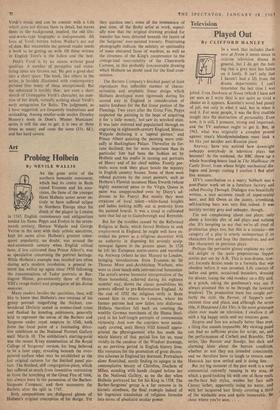Played Out
By CLIFFORD HANLEY IN a week that includes Dark- ness at Noon it seems mean to
criticise television drama in general, but I do get the feel- ing that a grey mist has fallen on it lately. It isn't only that
I haven't had a lift from the drama departments. I can't
remember the last time I was jolted. Even Darkness at Noon (which I have not yet seen as I write this) is not quite so vivid a choice as it appears. Koestler's novel had plenty of jolt, not only in what it said, but in when it said it. For most people, it was the first credible insight into the destruction of personality. Even now, it is still, I presume, strong and important, and the TV audience ought to get it. But, in 1963, what was originally a complex protest against man's bloodymindedness must look a bit like just another anti-Russian piece.
Anyway, have you noticed how downright unhappy everybody in television plays has become? At the weekend, the BBC threw up a whole boarding-house load in The Madhouse on Castle Street, from whose bright mechanical dia- logue and jumpy cutting I confess I fled after five minutes.
ITV's contribution to a merry Sabbath was a post-Pinter work set in a furniture factory and called Passing Through. Dialogue was beautifully written, a nice accurate touch of super-reality here; and Bill Owen as the jaunty, crumbling, self-loathing hero was very fine indeed. It was terribly terribly grey and unhappy, though.
I'm not complaining about sad plays; only about a forcible diet of sad plays and nothing else. It's tempting to say that we're all tired of proletarian plays too, but this is a mistake—the category of a play is utterly unimportant if its characters live and leap like themselves, and not like characters in previous plays.
Perhaps the pervasive gloom explains my can- did delight in the quite preposterous Sapper
stories put out by A-R. This is non-drama, non-
art, formula fiction made to a formula that was obsolete before it was invented. Life consists of ladies and gents, occasional bounders, dressing
for dinner, losing the odd monkey on a filly and, at a pinch, taking the gentleman's way out (I
always assumed this to be through the lavatory window). The production team has caught per- fectly the style, the flavour, of Sapper's non- existent time and place, and although the series title, It Happened Like This, is the most grotesque claim ever made on television, I swallow it all- with a big happy smile and my tensions gone.
Steptoe and Son are actually better than ever, a thing that sounds impossible. My viewing panel can find no sufficient praise for script, set, and the performances of Corbett and Bramble. This series, like Bootsie and Snudge, has dark and alarming hints about the human condition, whether or not they are intended consciously, and we therefore have to laugh to remain sane. Hancock has now settled and is doing fine.
But my big moment of the past week is a soar) commercial currently running in my area, in which a good-looking bit with one of those matt, on-the-face hair styles, washes her face with Camay lather, apparently using no water, and with her lacquered hair firmly covering a third of the washable area and quite immovable. Be clean where you're seen. . .






























 Previous page
Previous page